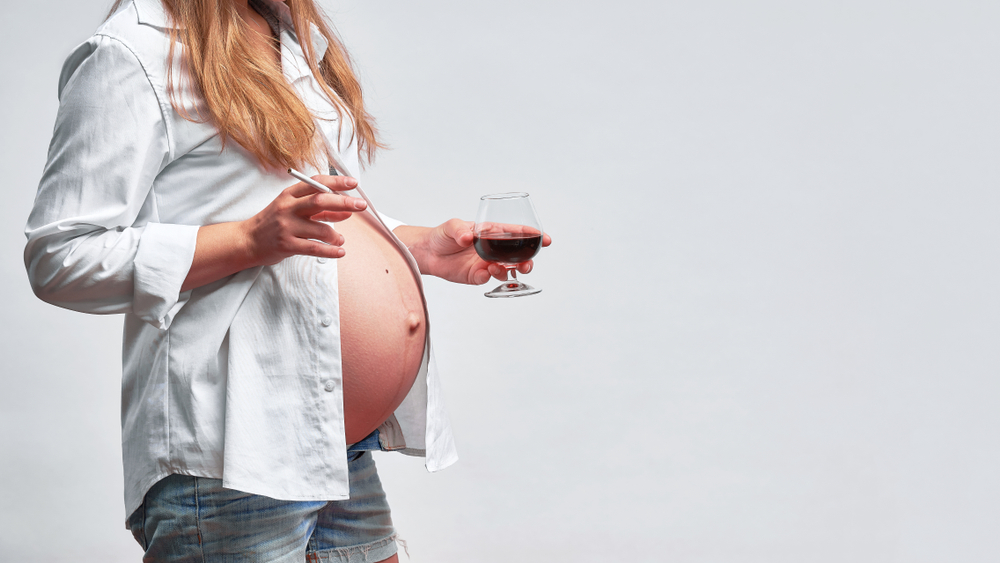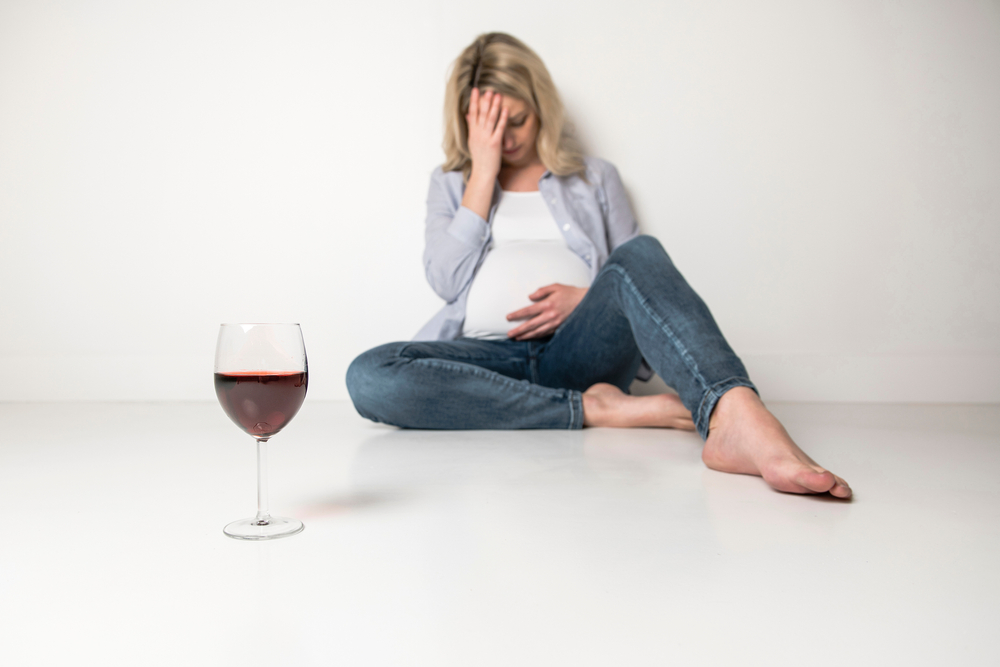Last Updated:
June 24th, 2025
“Can I drink alcohol when pregnant?”. It’s one of the most commonly searched questions by expectant mothers, and understandably so. For some, it’s a simple curiosity: Is one glass of wine with dinner really that harmful? But for others, typing that question into Google comes from a more vulnerable place, one where the thought of stopping feels harder than it should.
In this guide, we explore the truth about drinking alcohol during pregnancy and offer support if you’re finding it difficult to stop.

What effects does a small amount of alcohol have on the fetus?
The honest answer is that we still don’t fully know the effects of low to moderate drinking during pregnancy. A large meta-analysis reviewing multiple studies across different countries found no clear, consistent pattern when it came to how small amounts of alcohol affect a baby’s development. Some studies showed slightly negative effects, particularly with behaviour. Others found no impact at all. A few even hinted at small cognitive benefits—but these were likely due to external factors like family environment or parental education, not the alcohol itself.
The researchers noted that the wide range of results likely came from differences in study methods and the difficulty in tracking alcohol exposure accurately. In short, the evidence is too mixed to draw any solid conclusions.
But with so much uncertainty and with so much at stake, would you really want to take the chance?
What effects does a large amount of alcohol have on the fetus?
One thing we are sure of is this: heavy drinking during pregnancy can have serious and lasting effects on the developing baby. While research is still ongoing around the impact of light or moderate drinking, the risks linked with larger amounts of alcohol are well documented and concerning.
Miscarriage risk
Some studies suggest that drinking heavily during pregnancy may increase the risk of miscarriage, particularly in the early stages. However, the findings across studies have been mixed. One reason for this is that people who drink during pregnancy may also be more likely to have other risk factors, such as smoking or underlying mental health conditions like depression, which can also raise the risk of miscarriage. That said, alcohol is a known toxin and, when consumed in large quantities, can create an unsafe environment for the developing fetus.
Congenital disabilities and developmental issues
Alcohol is what’s known as a teratogen, a substance that can interfere with fetal development and lead to birth defects. Drinking heavily during pregnancy can lead to a range of serious problems, including:
- Physical abnormalities such as heart, kidney and bone defects
- A smaller head and body size
- Abnormal facial features often associated with Fetal Alcohol Syndrome (FAS)
Fetal Alcohol Spectrum Disorder (FASD)
Heavy alcohol use can also cause Fetal Alcohol Spectrum Disorder (FASD), an umbrella term for a range of physical, behavioural and cognitive challenges. The most severe form, Fetal Alcohol Syndrome (FAS), is marked by:
- Growth delay
- Facial differences
- An impact on learning
- An impact on memory
- An impact on behaviour
- An impact on social interaction
These effects are lifelong and often require ongoing support.
The likelihood of FASD is linked to how much alcohol is consumed, how often and individual factors like genetics and nutrition. Even within the same person, one pregnancy might be more affected than another.
With all the evidence surrounding alcohol use in pregnancy either being uncertain or packed with negative outcomes, it’s easy to surmise that the safest option is to avoid it altogether. But what if you’re struggling to pause alcohol consumption in your life?

I’m struggling to quit alcohol whilst pregnant
If you’re finding it hard to stop drinking during pregnancy, you’re not alone. It’s actually quite common to feel a pull toward alcohol, especially if it played a role in how you relaxed, socialised or coped with stress before you got pregnant. Pregnancy can come with a strange sense of disconnect, as though your body is no longer your own and old habits can start calling in moments of emotional overload.
Many women do find that the idea of protecting their baby is enough to stop drinking and that’s a powerful motivator. But if you’re still finding it difficult to resist, even when you want to, it could be a sign that something deeper is going on. It might not just be about alcohol; it could also be about stress, trauma, anxiety or other challenges that need proper attention and care.
If you’re not sure where you stand, try answering the following questions honestly:
- Have you had any drinks since finding out you were pregnant, even though you planned not to?
- Do you feel guilty or ashamed after drinking during pregnancy?
- Have you found yourself hiding alcohol or how much you’re drinking, from others?
- Are you struggling to relax, sleep or cope with stress unless you have a drink?
- Have you tried to stop drinking during pregnancy but found you couldn’t?
- Do you feel like alcohol is helping you deal with emotions you’re afraid to face right now?
If you answered ‘yes’ to one or more of these questions, reading on is crucial. There is support available and understanding what to do next can make all the difference — both for you and your baby.
AUD and pregnancy
Unfortunately, some expecting mothers do experience AUD and treating the addiction during pregnancy can be especially complex.
For example, most of the medications used to ease withdrawal or reduce cravings haven’t been thoroughly tested in pregnant women. That leaves doctors with difficult decisions and few clear guidelines. Even psychological therapies, which are often safe and effective, don’t have a one-size-fits-all solution when it comes to pregnant clients.
But that doesn’t mean help isn’t available. It just means it needs to be the right kind of help. Ultimately, decisions around treating AUD in pregnant women must be made carefully and on a case-by-case basis. There are no simple answers but what matters most is ensuring both mother and baby are safe, supported and cared for with compassion.
What can I do next?
If you’re pregnant and finding it difficult to quit alcohol, Addiction Helper is here for you. We understand this is a sensitive and difficult situation that can bring fear, shame and uncertainty. But you’re not alone. The most important step right now is reaching out to people who understand what you’re going through and can guide you towards the safest, most compassionate support available.
Our team is here to help you explore your options and make a plan that works for you and your baby.
Our compassionate team are ready and available to take your call, and guide you towards lasting the lasting addiction recovery you deserve.
Frequently Asked Questions
(Click here to see works cited)
- Bandoli G, Hayes S, Delker E. Low to Moderate Prenatal Alcohol Exposure and Neurodevelopmental Outcomes: A Narrative Review and Methodological Considerations. Alcohol Res. 2023 Mar 16;43(1):01. doi: 10.35946/arcr.v43.1.01. PMID: 36950180; PMCID: PMC10027299.
- MotherToBaby | Fact Sheets [Internet]. Brentwood (TN): Organization of Teratology Information Specialists (OTIS); 1994-. Alcohol. 2024 Feb. Available from: https://www.ncbi.nlm.nih.gov/books/NBK582563/
- DeVido J, Bogunovic O, Weiss RD. Alcohol use disorders in pregnancy. Harv Rev Psychiatry. 2015 Mar-Apr;23(2):112-21. doi: 10.1097/HRP.0000000000000070. PMID: 25747924; PMCID: PMC4530607.

